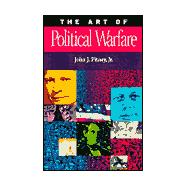Pitney discusses how military principles can explain victory or defeat in politics, whether for an election campaign or a legislative blitz. Each chapter takes a single concept from the military -- strategy, leadership, training, intelligence, deception, logistics, friction, and family -- and applies it to political concerns ranging from campaign warchests to legislative tactics.
This original book will appeal to campaign operatives, armchair political strategists, and students of political science. In this presidential election year, The Art of Political Warfare is necessary reading for people fighting in the political trenches or for those who simply want an engrossing view of the battlefield.








